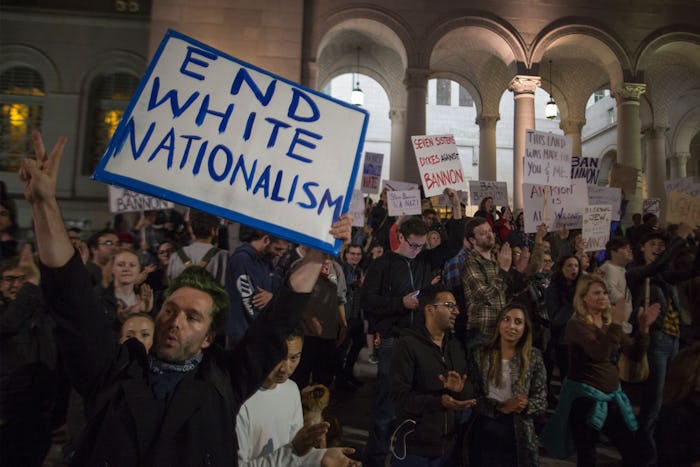News

Associated Press "Alt-Right" Guidelines Are Strict About One Very Specific Point
The term "alt-right" has been popping up in news articles with alarming frequency since Donald Trump's election, but the usage is often unclear, leaving many people confused about what exactly the term implies. Now, the Associated Press (aka the great deciding power in journalistic principles) has released new AP style guidelines on using the term "alt-right," and they're very strict about one important point. On the AP's blog, the AP's Vice President for Standards John Daniszewski introduced the new guidelines, emphasizing that the term should never be used without context.
Daniszewski noted,
"Alt-right" (quotation marks, hyphen and lower case) may be used in quotes or modified as in the "self-described" or "so-called alt-right" in stories discussing what the movement says about itself. Avoid using the term generically and without definition, however, because it is not well known and the term may exist primarily as a public-relations device to make its supporters' actual beliefs less clear and more acceptable to a broader audience.
So, to gladly comply with the AP, "alt-right" is a fancy new term for the same old racism. People who call themselves "alt-right" tend to espouse views that have been classified in the past as white supremacist, neo-Nazi, and racist beliefs. For example, at a gathering of the self-described "alt-right" in a federal building last week, attendees gave the Nazi salute and shouted "Hail Trump!" while the featured speaker, "alt-right" leader Richard Spencer, claimed that America was a "white country" that "belongs to us." ("Us" being people of white European descent.)
These new AP regulations are incredibly important. When journalists use the term "alt-right" without clarification, they downplay the danger of what this group of people believes. It is irresponsible to spread the movement's own rebranding instead of calling it out for what it is. As the AP's article on its new guidelines continued,
We should not limit ourselves to letting such groups define themselves, and instead should report their actions, associations, history and positions to reveal their actual beliefs and philosophy, as well as how others see them.
President-elect Donald Trump has disavowed the so-called "alt-right," telling The New York Times, "I don't want to energize the group, and I disavow the group." However, his actions have not always lined up with that disavowal. He appointed Steve Bannon, who turned conservative news outlet Breitbart into a platform for the so-called "alt-right," as his chief advisor. And on his influential Twitter account, he has not mentioned or repudiated the hate crimes that have been occurring since his election, choosing instead to focus on criticizing the cast of Hamilton for its respectful plea for equality to Mike Pence.
Kudos to the AP for clarifying the danger. Now, more than ever, the press has a responsibility to report on the changes happening in our country with clarity and honesty, and these new guidelines are a vital first step in making sure that happens.